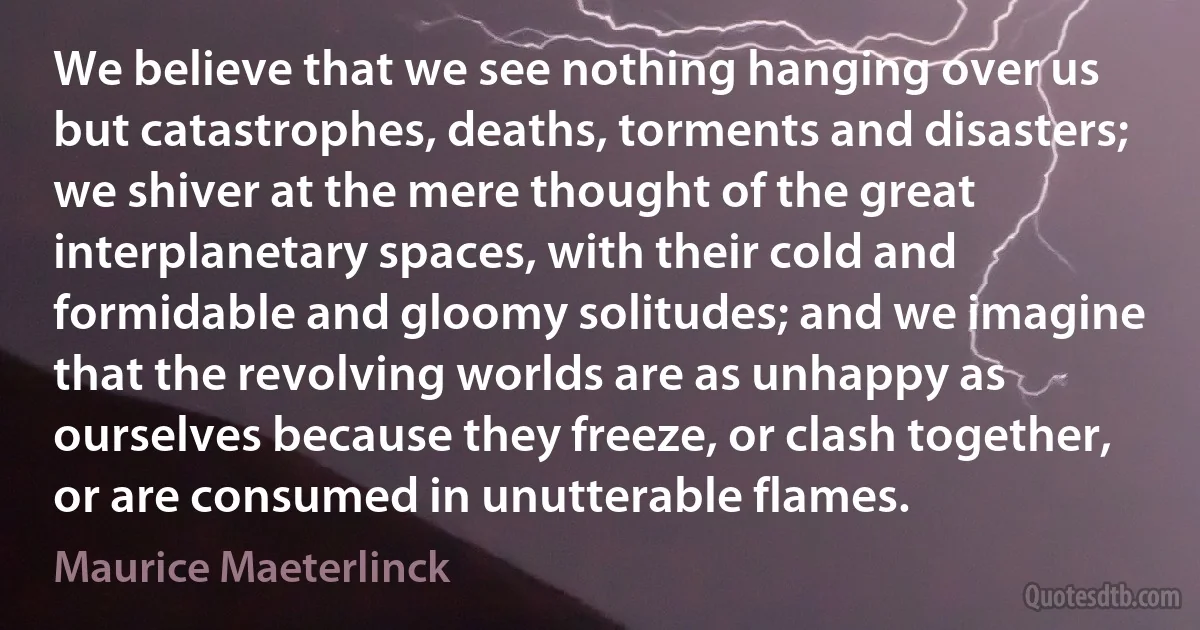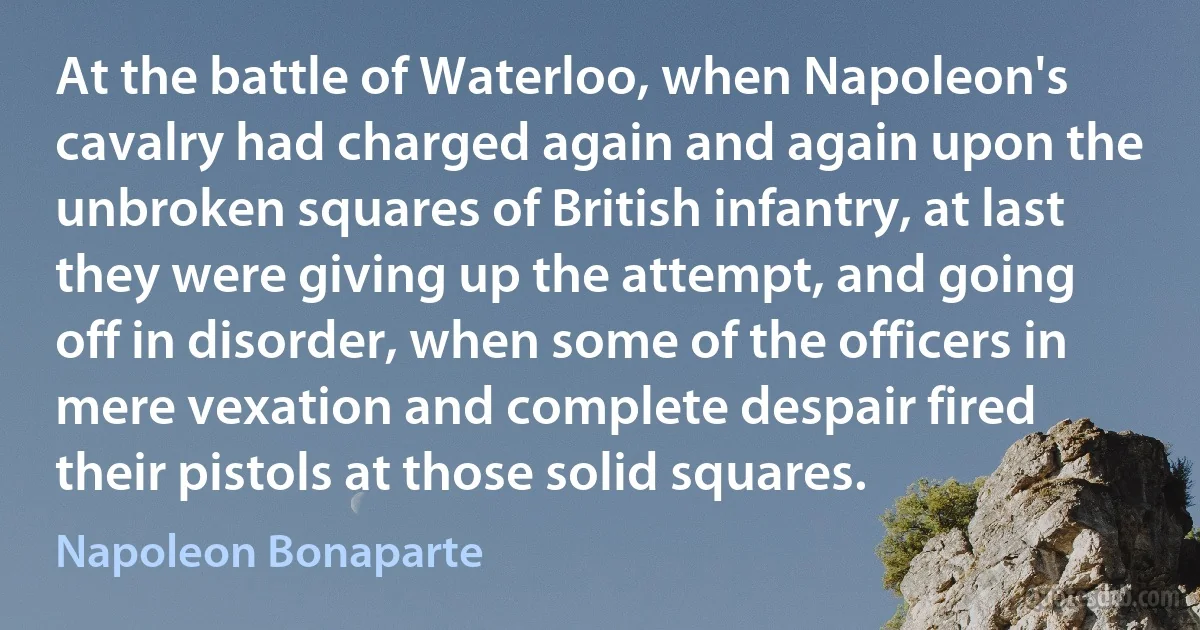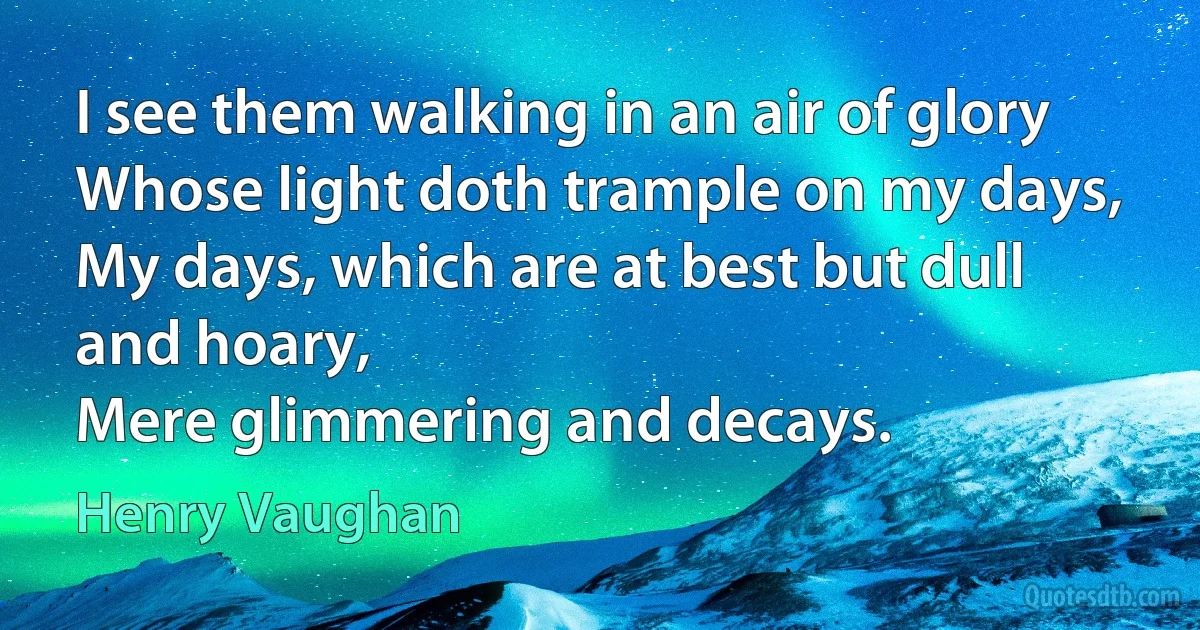Mere Quotes - page 53
What made Wordsworth's poems a medicine for my state of mind, was that they expressed, not mere outward beauty, but states of feeling, and of thought coloured by feeling, under the excitement of beauty. They seemed to be the very culture of the feelings, which I was in quest of. In them I seemed to draw from a Source of inward joy, of sympathetic and imaginative pleasure, which could be shared in by all human beings; which had no connexion with struggle or imperfection, but would be made richer by every improvement in the physical or social condition of mankind.

John Stuart Mill
When, however, not more than half that duration of time had elapsed, a small ray of light broke in upon my gloom. I was reading, accidentally, Marmontel's "Mémoires," and came to the passage which relates his father's death, the distressed position of the family, and the sudden inspiration by which he, then a mere boy, felt and made them feel that he would be everything to them-would supply the place of all that they had lost. A vivid conception of the scene and its feelings came over me, and I was moved to tears. From this moment my been grew lighter. The oppression of the thought that all feeling was dead within me, was gone. I was no longer hopeless: I was not a stock or a stone. I had still, it seemed, some of the material out of which all worth of character, and all capacity for happiness, are made.

John Stuart Mill
Capacity for [higher] nobler feelings is in most natures a very tender plant, easily killed, not only by hostile influences, but my mere want of sustenance; and in the majority of young persons it speedily dies away if the occupations to which their position in life has devoted them, and the society into which it has thrown them, are not favorable to keeping that higher capacity in exercise. Men lose their high aspirations as they lose their intellectual tastes, because they have not time or opportunity for indulging them; and they addict themselves to inferior pleasures, not because they deliberately prefer them, but because they are either the only ones to which they have access or the only ones which they are any longer capable of enjoying.

John Stuart Mill
The plans of Adolf Hitler for aggression were just as secret as Mein Kampf, of which over six million copies were published in Germany. He not only openly advocated overthrowing the Treaty of Versailles, but made demands which went far beyond a mere rectification of its alleged injustices (GB-128). He avowed an intention to attack neighboring states and seize their lands, which he said would have to be won with "the power of a triumphant sword."

Robert H. Jackson
Science has led to a multitude of results that affect men's lives. Some of these results are embodied in mere conveniences of a relatively trivial sort. Many of them, based on science and developed through technology, are essential to the machinery of modern life. Many other results, especially those associated with the biological and medical sciences, are of unquestioned benefit and comfort. Certain aspects of science have profoundly influenced men's ideas and even their ideals. Still other aspects of science are thoroughly awesome.

Warren Weaver
In everything, depend upon yourself, but work in harmony with all things. Do not depend even upon the Infinite, but learn to work and live in harmony with the Infinite. The highest teachings of the Christ reveal most clearly the principle that no soul was created to be a mere helpless instrument in the hands of Supreme Power, but that every soul should act and live in perfect oneness with that Power. And the promise is that we all are not only to do the things that Christ did, but even greater things.

Christian D. Larson
The Oriental heritage, due to the long sojourn of the Moors in Spain, had a profound influence on the taste of the people. From these Oriental invaders the Spaniards derived the great surfaces of blank wall with occasional spots of luxuriant ornament that characterize nearly all their work. From them also comes the love of bright color shown in the use of polychrome tiles and rich fabrics and in the painting and gilding of sculpture and ornamental motives. While the large constructive forms, particularly vaults and domes, are frankly and simply expressed, the ornament as in the work of the Orient, is rather an incrustation, a mere surface decoration, than a pretense at logical construction.

Clarence Stein
The second observation is that poetry is a universal human art. Despite post-modern theories of cultural relativism that assert there are no human universals, there exists a massive and compelling body of empirical data, collected and documented by anthropologists, linguists, and archeologists that demonstrates there is no human society, however isolated, that has not developed and employed poetry as a cultural practice. Most of this poetry, of course, has been oral poetry. Many of these cultures never developed writing. But the fact remains-and it is a demonstrable fact, not mere opinion-that every society has developed a special class of speech, shaped by apprehensible patterns of sound, namely, poetry.

Dana Gioia
"The Catholic writer understands the necessary relationship between truth and beauty, which is not mere social convention or cultural accident but an essential form of human knowledge--intuitive, holistic, and experiential. Art is a form of knowing--distinct and legitimate--rooted in feeling and delight--that discovers, in the words of Jacques Maritain, "The splendor of the secrets of being radiating into intelligence." (34).

Dana Gioia
To you, of right, these pages must be inscribed, the fountain of their best thoughts, not as mere praise, but for the instruction of others, to record the charm of perfect companionship, proved by your example; the instinctive homage even of brutes before the magic of an amiable and generous heart, without a selfish trace... Were all hearts tuned like yours, an appeal to human justice would not be needed: - Then to your name a fitter title might be inscribed - the Wrongs of Animals ceased for ever, the dubious vestiges of Eden might become the certain foot-prints of our dialy practice; and cruelty and suffering known no more.

David Mushet
The character and conquest of the invincible champion are ever the same. A Lacedaemonian died while writing with his own blood on a rock - " Sparta has conquered!" But, O,there is an illustration higher and better than any derived from mere earthly annals. Jesus veiled His glory in the skies; shrouded divinity in mortality, and with godhead and humanity coalesced in His person, entered the lists with more than mortal strife against the powers of hell. He drank the bitter cup with sublimer resignation than the sages of earth ever knew; contended victoriously where finite champions must inevitably have been destroyed; fell, like the strong man, destroying His foes by His death; persevered on our behalf in all the fearful descent from the august throne of the Eternal to the stony floor of the cold and gloomy sepulchre; that Hope's sweet fountain might gush up for mankind in Golgotha, and Salvation plant her banner with immortal triumph at the portal of the conquered tomb.

Elias Lyman Magoon
Few people actually nominate themselves in this way. Most defer to the meaning-making apparatus of their culture, taking comfort in the fact that others have built a meaning nest for them. This built-in cover allows them to avoid taking responsibility and at the same time causes them to grow grandiose, narcissistic, and egotistical. As soon as you put on the robes of your culture and add gravity to your mere humanness by wearing the badge of your profession, your club, your gang, or your clan, you ... refuse to engage in the process of personal meaning-making, with its requirements of honesty and self-awareness.

Eric Maisel
Viewed unsympathetically, this is nothing, a chance association-by-knees; yet if we cherish life, and are not mere creatures of death and sepulcher, deluded by the notion that only our own experience is real and our demise the end of the world, we see in it a reminder that we are all beads on a string - separate yet part of a unity.

Robertson Davies
When we come before the school board, most often we do not face those interested in the education of our children, but those interested in the maintenance of power. These contests are war. Any other paradigm is an illusion. It is not a mere contest, like athletes plunging down the hill on skis for the fastest time. It is not a dance in which the most graceful will be rewarded with a medal. This is war. Once we understand that the struggle is war, we can wage war and win.
The key to winning any war is to control the war. This does not mean I seek to control my opponent.

Gerry Spence



